Goats are changing lives!
Goats are amazing!! On a recent visit to Tanzania, Empower Tanzania staffer Sheri Krumm and volunteer Sarah Svorinic visited the newest expansion of the Integrated Farming Project….goats in Masandare! It was so exciting to meet our new farmers, and see what an impact this project is already having in their lives.
When Empower Tanzania begins a new project site, the first step is actually done by the community, who must request the project. We do an orientation with village leaders to let them know what we are all about, and if we all agree that we are a good fit, we form a project committee of local leaders and choose our first ten farmers. Both the project committee and the farmer group must include a variety of faiths within the community and at least 50% women.
The next step is carried out by Empower Tanzania Project Manager Joseph Kimbwereza, and our Monitoring and Evaluation Specialist, Emmanuel Youza. They begin to take baseline data, and organize training for the new farmers to learn how to care for these “modern” animals. Farmers are required to pen the animals (pens built to strict specifications) and learn about how to feed and water them correctly, as well as to provide good veterinary care for them.
Why do we use these “modern” animals? Because when cared for correctly, they produce much more milk than the average local goat. A small herd of modern goats is more profitable and less damaging to the environment than an average farmer’s huge herd of local goats. The penned goats also make harvesting manure very easy, and composting for gardens is possible. But that is another story for later. Let’s stick to the animals right now.
Once the farmers have built their pens, at their own expense, and have passed inspection and proved that they know how to care for the animals correctly, each farmer is given two female goats. Typically one is pregnant and one is ready to breed. The new herd of 20 goats also includes 4 bucks that have the very busy job of moving around throughout the project, breeding with any female that goes into heat.
Over the next year, the District Livestock Officer will do periodic inspections of the farms, as well as refresher training for the farmers. The farmers will also meet on a monthly basis to support each other in their efforts and trade ideas. Each monthly meeting will include a training topic such as how to make and store clean safe water or basic nutrition education, designed to help the farmers continue to improve their farms.
By year two, there will be kids everywhere, and we will be ready to move on to the next step, which is to introduce things like biogas plants, organic gardening, rooftop rainwater catchment systems, and of course, lots of training in bookkeeping and marketing so they can sell their products and MAKE MONEY!!!
If you are interested in supporting this project, and would like to purchase a goat as a Christmas Gift for a loved one, go visit our Crowdrise Fundraiser and join the team of people working to see that the project continues to grow in 2015!!

